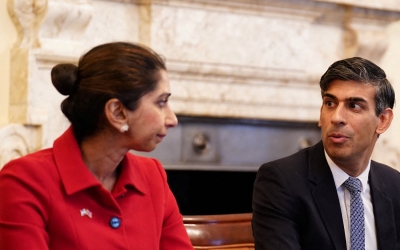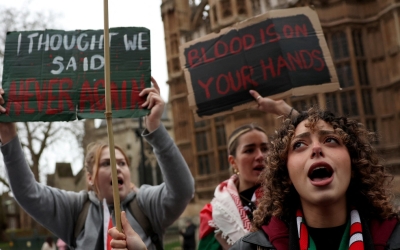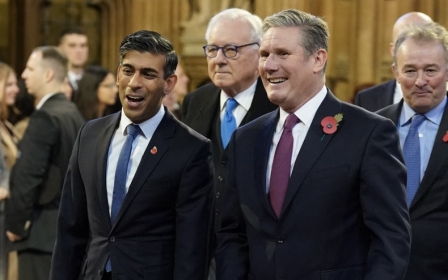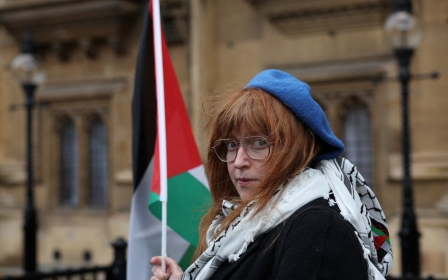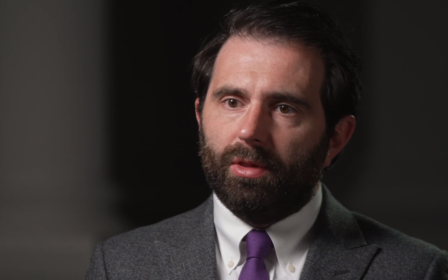War on Gaza: Sunak's Tories know they're losing the battle over Palestine protests
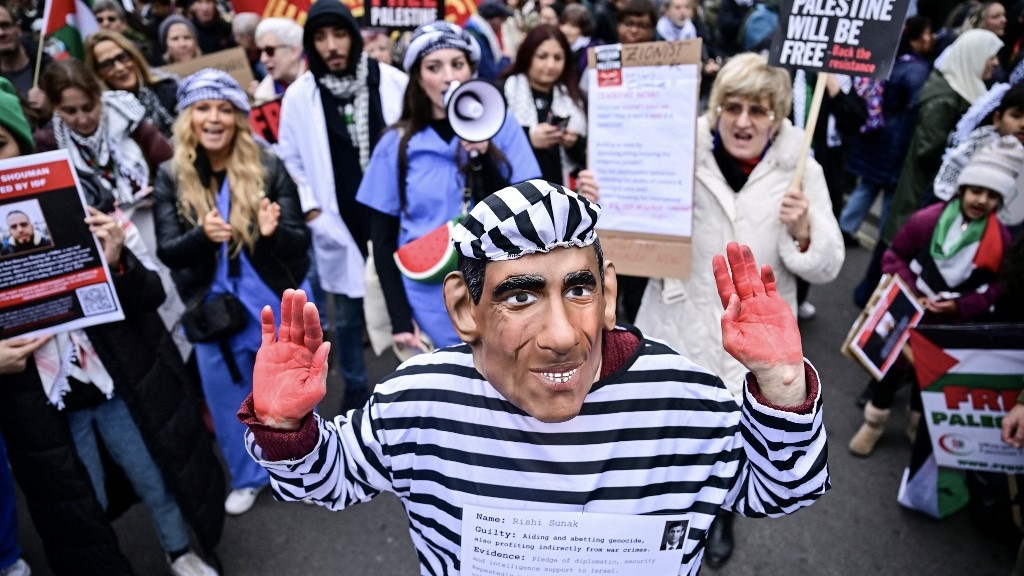
The 10th national Palestine march in London last Saturday came just a week after UK Prime Minister Rish Sunak appeared outside 10 Downing Street to make an unprecedented attack on the Palestine movement and just ahead of the expected announcement by Michael Gove of new regulations to crack down on "extremism".
So where, five months into the Israeli attack on Gaza, does the balance of power lie between the Palestine solidarity movement and the British political establishment?
Let’s start with the Palestine movement because it is routinely underreported and, when it is, often misrepresented in the mainstream media.
The first thing to say about the movement is that it is unprecedented in scale and intensity. Yes, there has been one single demonstration that has been larger than any of the recent Palestine demonstrations - the 15 February 2003 Iraq war demonstration of two million. By comparison, all the pro-Palestine ceasefire demonstrations have been in the hundreds of thousands and have come in a very condensed time frame.
The smallest of the protests, the first demonstration on 14 October last year, numbered 150,000. Since then, all have been over 200,000. One was half a million and the largest so far was 800,000, on 11 November, Armistice Day.
New MEE newsletter: Jerusalem Dispatch
Sign up to get the latest insights and analysis on Israel-Palestine, alongside Turkey Unpacked and other MEE newsletters
Last Saturday’s protest was also one of the larger at 400,000, proving that the movement has far from lost its mobilising capacity after months of continuous action.
For historical perspective, we would have to go back to the movement against the Iraq war, the suffragettes in the early 20th century, perhaps even the Chartists in the 19th century, to find such a sustained period of mass mobilisation.
Political consensus cracked open
This scale of mobilisation reflects wider support across society. The latest YouGov poll shows that two out of three people share the demonstrators’ aim of an immediate ceasefire in Gaza. This figure has risen by seven percent across the period that the demonstrations have taken place.
Follow Middle East Eye's live coverage for the latest on the Israel-Palestine war
Only 13 percent approve of more Israeli military action in Gaza, the unconditional position supported by both the Tory and Labour parties.
This mass support for the Palestinian movement has, over the months since October, cracked open the establishment political consensus. At the first protest, only one MP, Jeremy Corbyn, attended the march, highlighting the almost complete gulf between the mass reaction against Israel’s actions and the politicians’ almost universal endorsement.
But since then, a home secretary, Suella Braverman, has been fired after her attempt to ban protests and call out the far right to "protect" war memorials ended in a riot between far-right Tommy Robinson supporters and the police in Whitehall.
A cabinet reshuffle followed, the first in modern history to be the direct result of a confrontation between ministers and a mass movement.
From that moment on, the cracks opened in the political establishment. The Liberal Democrats called for a ceasefire, as did the Scottish and Welsh parliaments.
The Labour Party has lost more than 100 local councillors, and the debacle of the Rochdale by-election saw it withdraw its candidate, Azhar Ali, after accusations of antisemitism were levelled at him, thus paving the way for George Galloway to win on a tide of support for Palestine.
And, of course, all this is happening in an international environment where Israel has become politically isolated, facing investigation by the International Court of Justice for genocide, and protected at several crucial UN votes only by the US veto and UK abstention.
All of this brought the government to the week where it thought it needed to fight back.
That week began with Home Secretary James Cleverly telling protesters to desist and that the only proper recourse was the ballot box. This narrative was destroyed within a few days when, at the ballot box, the Palestinian cause triumphed in Rochdale. This immediately triggered Sunak’s first-ever Downing Street statement and re-ignited Gove’s extremism ban proposal.
Braverman debacle
The first thing to say about this conjuncture is that an already weak government, led by its second prime minister to have arrived in post without the authority of winning a general election, is on the defensive.
The government would dearly like to ban the demonstrations outright but it simply does not have the political support to do so. That was the meaning of the Braverman debacle.
So now the government is attempting to recoup lost ground by other means. One of those is peripheral harassment of the demonstrations themselves.
Police restrictions on the routes of the protests, dispersal orders, arrests of those carrying placards deemed to be offensive, the midnight searches of activists' houses and their arrests after the protests are now commonplace; however the Metropolitan Police is pushing back on the more overt attempts to encourage it into actions which won’t stand up in court.
Enter Michael Gove, self-proclaimed Zionist, and his assistant Robin Simcox, the government’s anti-extremism tsar and alumnus of the far-right Henry Jackson Society.
The Gove-Simcox plan is to create a sub-legal category of 'extremism' which will allow national and local government to blackball individuals and organisations that fall into it
The Gove-Simcox plan is to create a sub-legal category of "extremism" which will allow national and local government to blackball individuals and organisations that fall into it.
How wide will such proscriptions be? Well, Simcox has indicated it may affect the entirely moderate cross-community Muslim Council of Britain, or even all socialists and anti-fascists.
This approach is in itself another sign of government weakness. The reason why Gove and Simcox will not bring forward a new law banning "extremists" is that they know it cannot survive legal scrutiny and would be dead in the water as soon as it met any test in court.
But the lesser attempt to produce sub-legal government regulations against "extremism" is also running into trouble, with even the victims of terrorist attacks having written to the government telling them to stop demonising the Muslim community with this policy.
Right-wing Tories fear they will get trapped in the Gove-Simcox definition of extremism.
'Enemies within'
The main targets of the new policy, the Palestine movement and the left, simply will not accept the ban. It would be challenged in court and ignored in practice. There is very little likelihood that it would affect the scale of the existing pro-Palestinian movement.
It would, however, have another effect. It would further isolate the political class from the sentiments of the mass of citizens. For the second time in a generation, the British establishment would have committed the country to a foreign policy disaster opposed by the majority of voters.
As with Iraq, that dislocation in the political system would have serious consequences for years to come.
Moreover, the narrow and undemocratic defence of the establishment would weaken faith in the formal democratic structures of society and reinforce the view that ordinarily people are only listened to when they take matters into their own hands.
In other words, the effect would be exactly the opposite of the declared aims of the policy.
Finally, the policy would stoke Islamophobia as politicians sought "enemies within" who are extremists by dint of not sufficiently adhering to "British values".
More broadly, the policy would galvanise the far right both within and without the Tory party. It would come to dominate the election debate and the Tory leadership contest which lies on the other side of the general election.
The further polarisation of politics lies ahead of us.
The views expressed in this article belong to the author and do not necessarily reflect the editorial policy of Middle East Eye.
Middle East Eye delivers independent and unrivalled coverage and analysis of the Middle East, North Africa and beyond. To learn more about republishing this content and the associated fees, please fill out this form. More about MEE can be found here.



